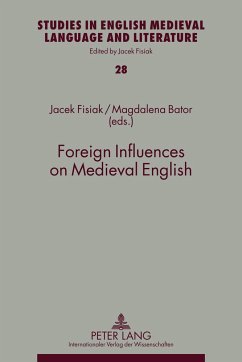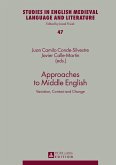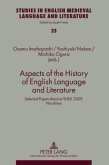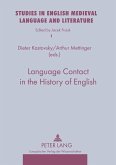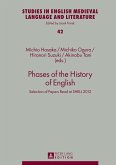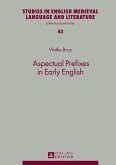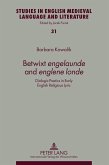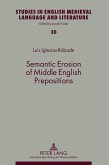Foreign Influences on Medieval English
Herausgegeben:Fisiak, Jacek; Bator, Magdalena
Foreign Influences on Medieval English
Herausgegeben:Fisiak, Jacek; Bator, Magdalena
- Gebundenes Buch
- Merkliste
- Auf die Merkliste
- Bewerten Bewerten
- Teilen
- Produkt teilen
- Produkterinnerung
- Produkterinnerung
The volume is a selection of papers presented at the International Conference on Foreign Influences on Medieval English held in Warsaw on 12-13 December 2009 and organized by the School of English at the Warsaw Division of the Academy of Management in Lódz (Wyzsza Szkola Przedsiebiorczosci i Zarzadzania). The papers cover a wide range of topics concerning the impact of Latin, Scandinavian, French and Celtic on Old and Middle English from orthography, morphology and syntax to lexical semantics and onomastics.
Andere Kunden interessierten sich auch für
![Approaches to Middle English Approaches to Middle English]() Approaches to Middle English80,20 €
Approaches to Middle English80,20 €![Aspects of the History of English Language and Literature Aspects of the History of English Language and Literature]() Aspects of the History of English Language and Literature114,05 €
Aspects of the History of English Language and Literature114,05 €![Language Contact in the History of English Language Contact in the History of English]() Language Contact in the History of English53,95 €
Language Contact in the History of English53,95 €![Phases of the History of English Phases of the History of English]() Phases of the History of English92,95 €
Phases of the History of English92,95 €![Aspectual Prefixes in Early English Aspectual Prefixes in Early English]() Vlatko BrozAspectual Prefixes in Early English69,20 €
Vlatko BrozAspectual Prefixes in Early English69,20 €![Betwixt 'engelaunde' and 'englene londe' Betwixt 'engelaunde' and 'englene londe']() Barbara KowalikBetwixt 'engelaunde' and 'englene londe'71,80 €
Barbara KowalikBetwixt 'engelaunde' and 'englene londe'71,80 €![Semantic Erosion of Middle English Prepositions Semantic Erosion of Middle English Prepositions]() Luis Iglesias-RábadeSemantic Erosion of Middle English Prepositions68,95 €
Luis Iglesias-RábadeSemantic Erosion of Middle English Prepositions68,95 €-
-
-
The volume is a selection of papers presented at the International Conference on Foreign Influences on Medieval English held in Warsaw on 12-13 December 2009 and organized by the School of English at the Warsaw Division of the Academy of Management in Lódz (Wyzsza Szkola Przedsiebiorczosci i Zarzadzania). The papers cover a wide range of topics concerning the impact of Latin, Scandinavian, French and Celtic on Old and Middle English from orthography, morphology and syntax to lexical semantics and onomastics.
Produktdetails
- Produktdetails
- Studies in English Medieval Language and Literature 28
- Verlag: Peter Lang
- Artikelnr. des Verlages: 261424
- 1. Auflage
- Seitenzahl: 328
- Erscheinungstermin: 6. Januar 2011
- Englisch
- Abmessung: 216mm x 153mm x 21mm
- Gewicht: 520g
- ISBN-13: 9783631614242
- ISBN-10: 3631614241
- Artikelnr.: 32458704
- Herstellerkennzeichnung Die Herstellerinformationen sind derzeit nicht verfügbar.
- Studies in English Medieval Language and Literature 28
- Verlag: Peter Lang
- Artikelnr. des Verlages: 261424
- 1. Auflage
- Seitenzahl: 328
- Erscheinungstermin: 6. Januar 2011
- Englisch
- Abmessung: 216mm x 153mm x 21mm
- Gewicht: 520g
- ISBN-13: 9783631614242
- ISBN-10: 3631614241
- Artikelnr.: 32458704
- Herstellerkennzeichnung Die Herstellerinformationen sind derzeit nicht verfügbar.
Jacek Fisiak is a retired professor and head of the School of English at Adam Mickiewicz University, Poznä (Poland), and currently head of the School of English at the Warsaw Division of the Academy of Management (Wy¿sza Szköa Przedsi¿biorczöci i Zarz¿dzania) in ¿ód¿. He has published widely in the area of English linguistics including the history of English, Old and Middle English and historical dialectology on both sides of the Atlantic. Magdalena Bator, born in 1980, received her PhD from Adam Mickiewicz University, Poznä in 2008. Currently she is a lecturer at the School of English at the Warsaw Division of the Academy of Management (Spöeczna Wy¿sza Szköa Przedsi¿biorczöci i Zarz¿dzania) in Warsaw. Her research interests focus on various aspects of English historical linguistics, in particular historical lexicology.
Contents: Rafal Molencki: New prepositions and subordinating conjunctions of Romance origin in Middle English - Alpo Honkapohja: Multilingualism in Trinity College Cambridge Manuscript O.1.77. - Justyna Rogos: On the pitfalls of interpretation: Latin abbreviations in MSS of the Man of Law's tale - Hans Sauer: Patterns of Loan-Influence on the Medieval English Plant Names, with Special Reference to the Influence of Greek With gratitude for M LC 1970 - Richard Dance: 'Tomarzan hit is awane': Words derived from Old Norse in four Lambeth Homilies - Marcin Krygier: On the Scandinavian origin of the Old English preposition til 'till' - Izabela Czerniak: Anglo-Scandinavian language contacts and word order shift in early English - Justyna Karczmarczyk: In the realm of fantasy: wyrm/worm vs. draca and dragon in Medieval English - Artur Bartnik: The Celtic hypothesis revisited: Relative clauses - Anya Kursova: Indirect borrowing processes from Latin into Old English: The evidence of derived and compound nouns from the first book of Bede's Ecclesiastical history of the English people and its interpretation in the light of naturalness theory - Hans-Jürgen Diller: Why ANGER and JOY? Were T NE and BLISS not good enough? - Marta Sylwanowicz: And this is a wonderful instrument...: Names of surgical instruments in Late Middle English medical texts - Wolfgang Viereck: French influences on English surnames - Magdalena Bator: French culinary vocabulary in the 14th-century English - Jerzy Welna: Leal/real/viage or loyal/royal/voyage. On the distribution of the forms of loanwords from Norman and Parisian French in Middle English - Kinga Sadej-Sobolewska: On the incorporation of river into English.
Contents: Rafal Molencki: New prepositions and subordinating conjunctions of Romance origin in Middle English - Alpo Honkapohja: Multilingualism in Trinity College Cambridge Manuscript O.1.77. - Justyna Rogos: On the pitfalls of interpretation: Latin abbreviations in MSS of the Man of Law's tale - Hans Sauer: Patterns of Loan-Influence on the Medieval English Plant Names, with Special Reference to the Influence of Greek With gratitude for M LC 1970 - Richard Dance: 'Tomarzan hit is awane': Words derived from Old Norse in four Lambeth Homilies - Marcin Krygier: On the Scandinavian origin of the Old English preposition til 'till' - Izabela Czerniak: Anglo-Scandinavian language contacts and word order shift in early English - Justyna Karczmarczyk: In the realm of fantasy: wyrm/worm vs. draca and dragon in Medieval English - Artur Bartnik: The Celtic hypothesis revisited: Relative clauses - Anya Kursova: Indirect borrowing processes from Latin into Old English: The evidence of derived and compound nouns from the first book of Bede's Ecclesiastical history of the English people and its interpretation in the light of naturalness theory - Hans-Jürgen Diller: Why ANGER and JOY? Were T NE and BLISS not good enough? - Marta Sylwanowicz: And this is a wonderful instrument...: Names of surgical instruments in Late Middle English medical texts - Wolfgang Viereck: French influences on English surnames - Magdalena Bator: French culinary vocabulary in the 14th-century English - Jerzy Welna: Leal/real/viage or loyal/royal/voyage. On the distribution of the forms of loanwords from Norman and Parisian French in Middle English - Kinga Sadej-Sobolewska: On the incorporation of river into English.

